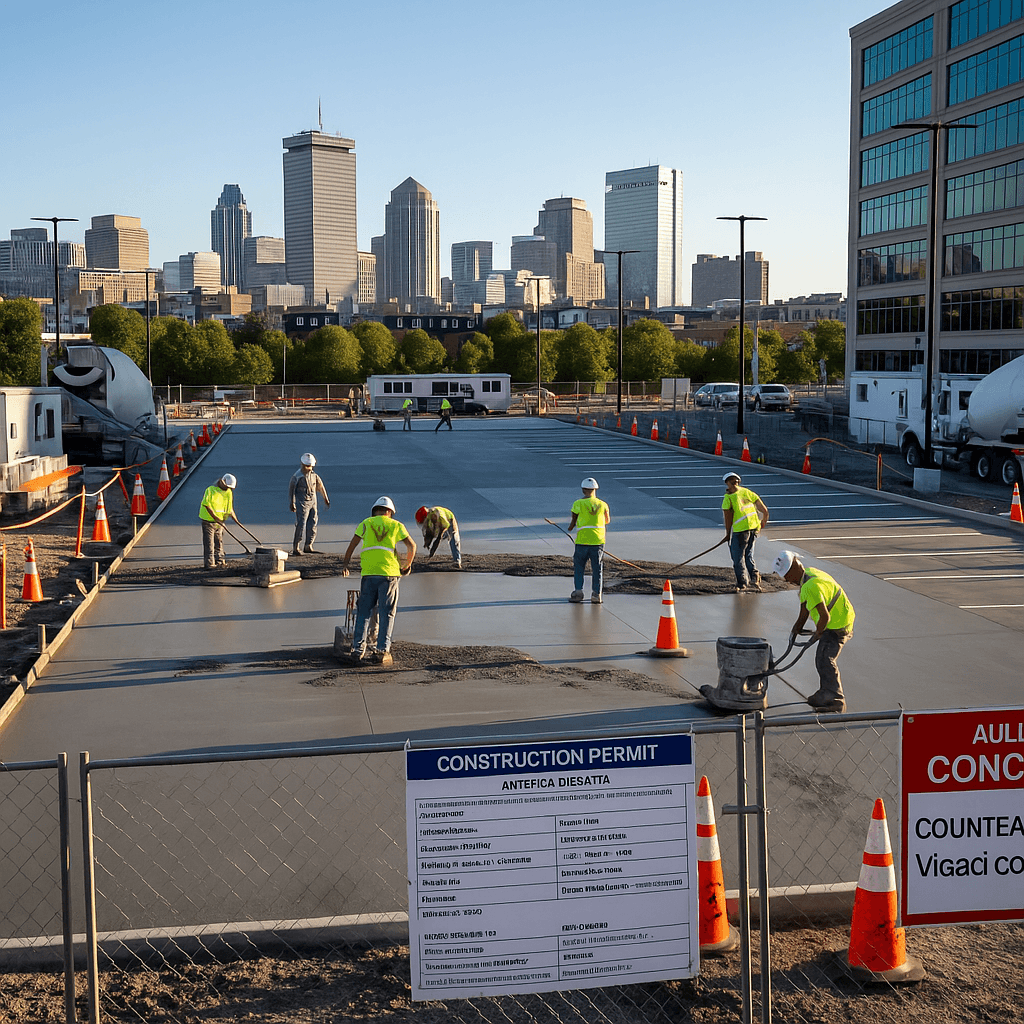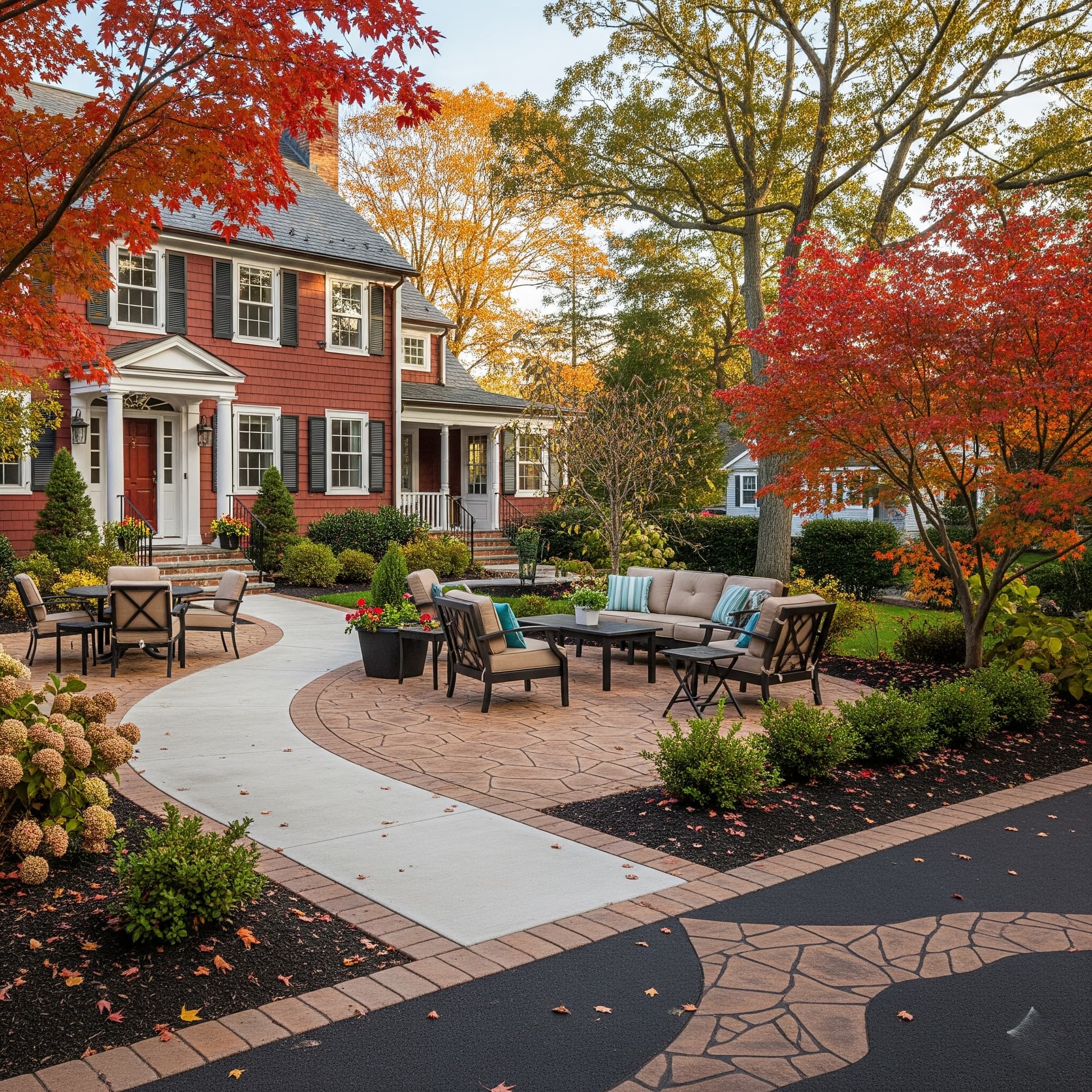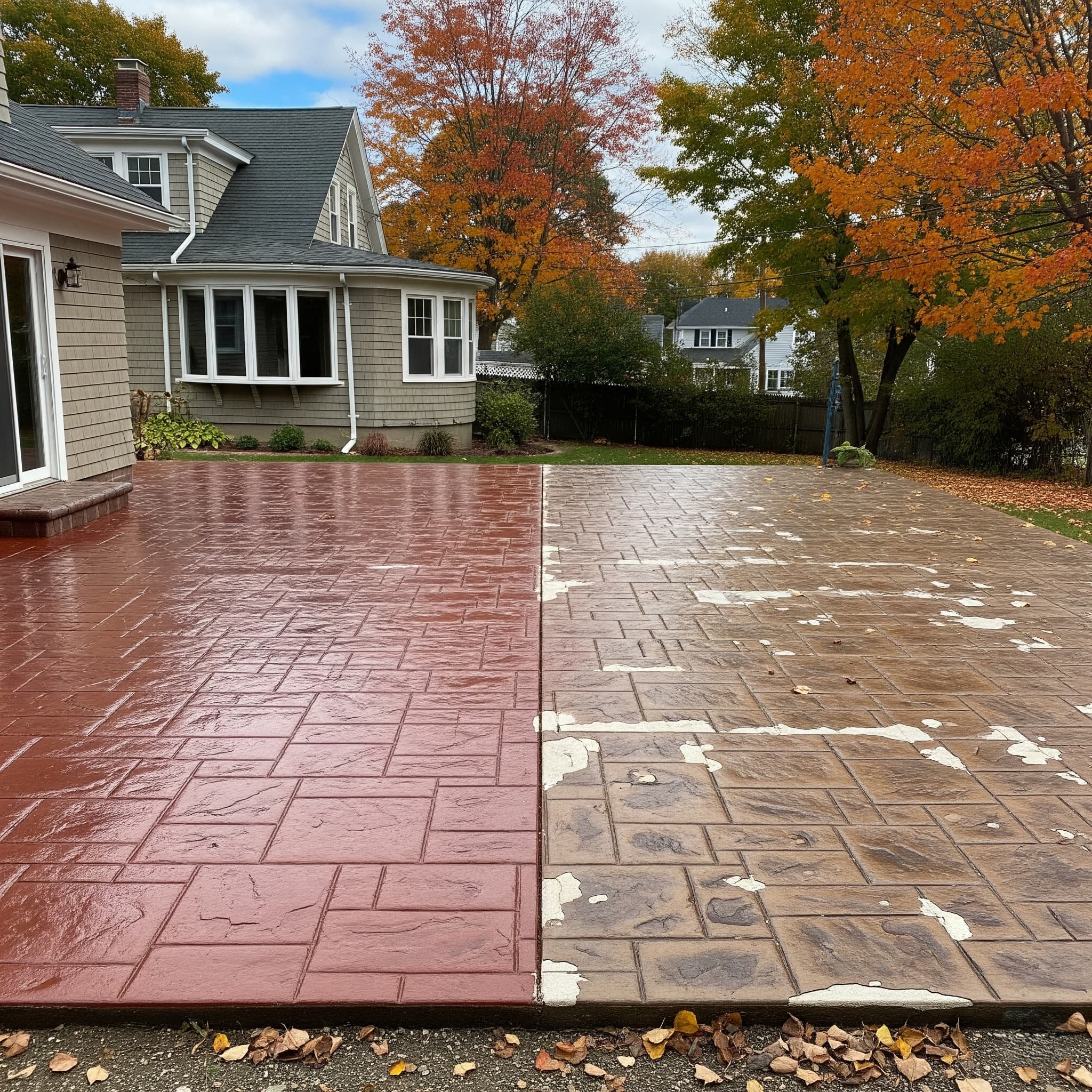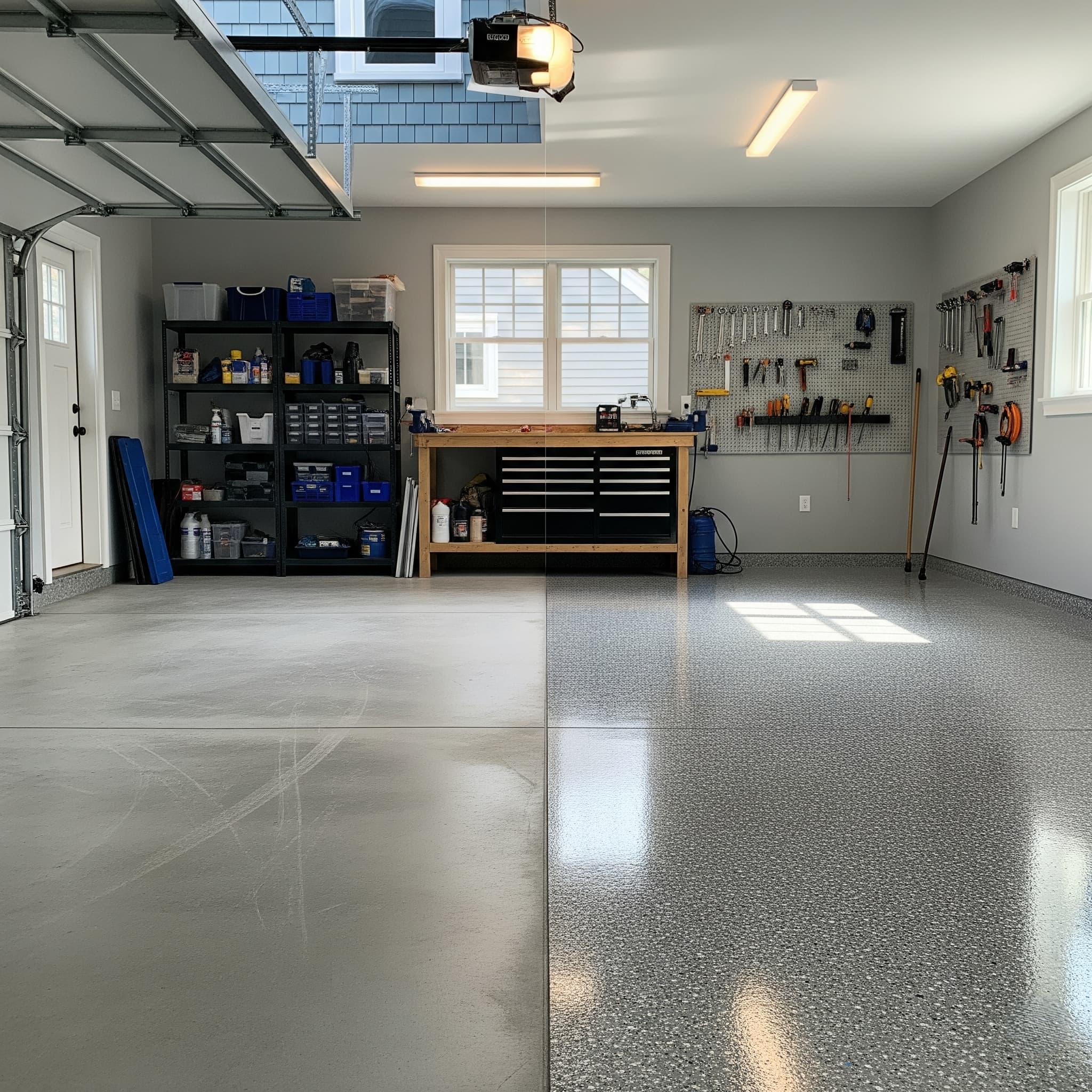
Commercial Concrete Flatwork Costs & Permits in Boston
Commercial Concrete Boston
Commercial flatwork projects across Greater Boston need a good financial analysis of costs and a complete analysis of permits in order to accomplish their projects successfully. Business owners from the Financial District office complexes to retail developments on the outskirts of Newton will find that the different costs and rules regarding concrete installation vary as they attempt to install concrete slabs. Knowing the flat work pricing process, how to go about getting a permit, and what is required by the local Rules will enable business owners to effectively budget for their project and stay away from expensive delays in their project timeline. Contractors who specialize in installing concrete slabs are knowledgeable of the complexities involved with obtaining permits in the city of Boston and provide quality concrete slab construction, which will meet the specifications of commercial properties and standards set by the City of Boston.

Commercial Concrete Flatwork Pricing Structure
Commercial flatwork projects in Boston generally price from $6 to $12 per square foot; this is inclusive of site preparation, materials, and professional installation. Standard concrete slabs can range from $9 to $15 per square foot, depending upon thickness and structural-specification needs. Larger-scale projects frequently enjoy the benefits of volume pricing, which lowers installation cost per square foot for installations larger than 10,000 square feet.
Concrete Materials Cost
Average costs for concrete materials in the Greater Boston area are $173 to $208 per cubic yard. Delivery costs vary from $160 to $340 per truck, depending on the project’s location and traffic issues. Labor accounts for approximately 40 to 50 percent of the total project cost, with skilled labor costing $50 to $80 per hour. Therefore, large-scale flatwork projects will need to have a thorough cost analysis that includes the materials, labor, and equipment involved in the project.
Cost of Parking Lot and Sidewalk Installations
Commercial parking lots can range in price from $5.50 to $7.50 per square foot for standard concrete installations. Decorative or high-performance specifications will raise prices to $8 to $12 per square foot. ADA-compliant sidewalk construction will range in price from $6 to $10 per square foot, including proper sloping calculations. Additionally, Massachusetts has regulations regarding specific accessibility features that impact pricing.
The cost of site preparation will vary greatly depending upon existing conditions, quality, and drainage requirements. Generally speaking, excavation and base preparation will add $2 to $4 per square foot to total project costs. Additionally, utility coordination will require additional engineering and scheduling considerations in the County. Projects located near Boston Harbor or environmentally-sensitive locations will incur additional regulatory oversight.
Building Permits Required by Boston
Boston’s Inspectional Services Department requires building permits for all commercial concrete flatwork projects. Permit applications are submitted and processed via the city’s online portal system using specific documentation requirements. Presently, long-form permits cost $50 plus $10 per $1,000 of project value for major construction work. Minor flatwork modifications may qualify for short-form licenses at lower fees. As such, a $100,000 commercial concrete project will require $1,050 in permit fees, plus any applicable inspection fees.
Permit Applications Require
Permit applications require detailed construction drawings and site plans illustrating setbacks and surrounding structures. Additionally, proof of contractor licensure and insurance coverage must accompany each submission. In addition, projects greater than 1,000 square feet will require review by the Zoning Board, which may extend approval timeframes. Any work occurring within 100 feet of parks, waterways, or historic districts will also require additional approvals from various departments.
Street Occupancy and Public Works Coordination
All projects impacting public sidewalks or requiring street access must obtain separate permits from Boston’s Public Works Department. Presently, street occupancy permits cost a base fee of $50 plus $0.10 per square foot daily for the first 500 square feet. All additional areas will cost $0.05 per square foot, thus requiring coordination with City officials to reduce costs and avoid traffic-disruption penalty costs. As such, contractors must plan to minimize permit costs and avoid penalties associated with traffic disruptions.
Utility coordination is crucial for all installations near existing infrastructure in Boston. Gas, electric, water, and telecommunication providers must coordinate their activities to meet safety requirements before commencing an installation. Additionally, Dig Safe notifications must be submitted no less than 72 hours before commencing excavation. Historic neighborhoods, such as Back Bay and Beacon Hill, are subject to even more stringent regulation and possible archaeological consideration.
Factors Affecting the Project Timeline and Scheduling
The project timeline for commercial concrete flatwork installations ranges from 2 to 6 weeks from permit application to completion. The project-scope complexity and weather conditions will directly impact the timeline requirements of each project. Unfortunately, the harsh winters in Boston limit the ideal temperature for concrete pouring. Therefore, the spring construction season often creates scheduling bottlenecks due to increased demand. As such, early planning and flexible scheduling will best allow for weather-related delays and permit-processing timeframes.
Large-scale installations utilize specialized equipment, such as laser screeds, power finishing tools, and concrete pumps. Coordinated delivery and operational schedules will ensure the timely completion of large-scale installations. Additionally, projects over 5,000 square feet often install concrete in phases to maintain quality control. Final curing requirements and commercial specifications necessitate achieving specified concrete strengths and finishing standards.
Inspections and Quality Control Measures
There will be multiple inspections throughout the construction process for commercial concrete installations. Footing inspections, verification of proper placement of reinforcement, and final surface compliance checks will ensure compliance with codes and regulations. The Inspectional Services Department will schedule inspections within 48 hours of receiving notification from licensed contractors. Additionally, coordinating inspections will prevent costly delays during critical phases of the installation.
Quality control measures will include ensuring the correct temperature of the concrete during installation. Adequate curing time before loading will also help to prevent premature failure of the installation and ensure structural integrity. Documentation of all installation procedures will support warranty and liability requirements. Specifically, projects must achieve the specified flatness and levelness tolerances, particularly for warehouse applications. Finally, after completing all aspects of the installation, final inspections will confirm ADA compliance, proper drainage, and surface-finish quality before permit closure.
Specialized Commercial Applications
Industrial concrete flatwork will require special mix designs and installation methods. Heavy-equipment loads, chemical exposure, and high-traffic conditions will necessitate enhanced specifications. Warehouse floors frequently require super-flat concrete with F-numbers exceeding those required for standard commercial applications. Therefore, installation costs will increase by 15 to 25% for these demanding applications.
Specialized floors may include integral colors, hardening admixtures, or surface treatments. These enhancements will add $1 to $3 per square foot to base pricing. Retail and hospitality installations will emphasize appearance and durability through decorative elements. Examples include stamped, stained, or exposed-aggregate finishes, which may add $2 to $8 per square foot above base pricing. The investment in decorative elements ultimately enhances customer experience and decreases maintenance requirements.
Selection of Contractors and Project Management
Experienced contractors possessing the necessary licenses, insurance coverage, and documented history of success will successfully manage complex urban projects. In Massachusetts, contractors must possess the proper licenses for commercial work, with bond requirements dependent upon the scope of the project. Prevailing wages and union-labor agreements will also influence contractor selection in the Greater Boston construction market.
Effective project management coordinates general contractors, subcontractors, suppliers, and City-Town Inspectors. Experienced contractors develop long-term working relationships with local suppliers and understand the permitting process. Additionally, they will demonstrate flexibility and the ability to develop contingency plans to mitigate weather-related scheduling challenges.
Terms and Conditions of Contracts and Risk Management
A well-structured contract will detail performance criteria, quality standards, and timeline requirements and establish formal procedures for documenting changes in scope. Typical payment schedules follow milestone-based construction progressions, and retainage is withheld until final inspection approval. Unfortunately, weather delays, permit complications, and unexpected site conditions often challenge urban construction projects. As such, the terms and conditions of the contract must explicitly define the risks that may arise and how they will be addressed to protect both parties.
Comprehensive insurance coverage, proper safety protocols, and compliance with OSHA regulations govern commercial construction sites. Specifically, workers’ compensation insurance, general liability insurance, and professional liability insurance must be adequate to cover the project-specific exposures. Performance bonds or other forms of financial guarantees are available to protect property owners in case a contractor defaults. As such, the risk-management strategies implemented will help ensure the successful completion of projects despite possible obstacles.
Value Created by Long-Term Use and Maintenance of Commercial Concrete Flatwork
High-quality commercial concrete flatwork can provide 20 to 30 years of reliable use when properly installed and maintained. Protective maintenance, including regular cleaning, sealant application, and periodic re-sealing, will further extend the life of the concrete. Maintaining the aesthetic standards of commercial installations will also preserve the credibility and customer confidence of businesses. As such, the initial investment in quality installation and materials will significantly reduce the overall cost of ownership.
Proper installations will include installing expansion joints, adequate drainage systems, and suitable reinforcement. Due to Boston’s freeze-thaw cycles and ground movement, proper design considerations will be necessary. Local soil conditions, drainage patterns, and environmental factors will also affect long-term performance. High-quality installations will improve the value of properties and generate favorable impressions for customers and business associates.
Boston Concrete Works specializes in commercial concrete flatwork projects throughout the Greater Boston area. Our complete services include obtaining permits through to final inspection approval and project completion. Our experienced teams understand local regulations, quality standards, and commercial specifications. Therefore, we can complete successful flatwork installations that effectively serve businesses for decades.
LATEST POSTS


Cost & ROI of Decorative Concrete Upgrades for Boston Homes

Stamped Concrete Mistakes to Avoid in Wet/New England Climates

